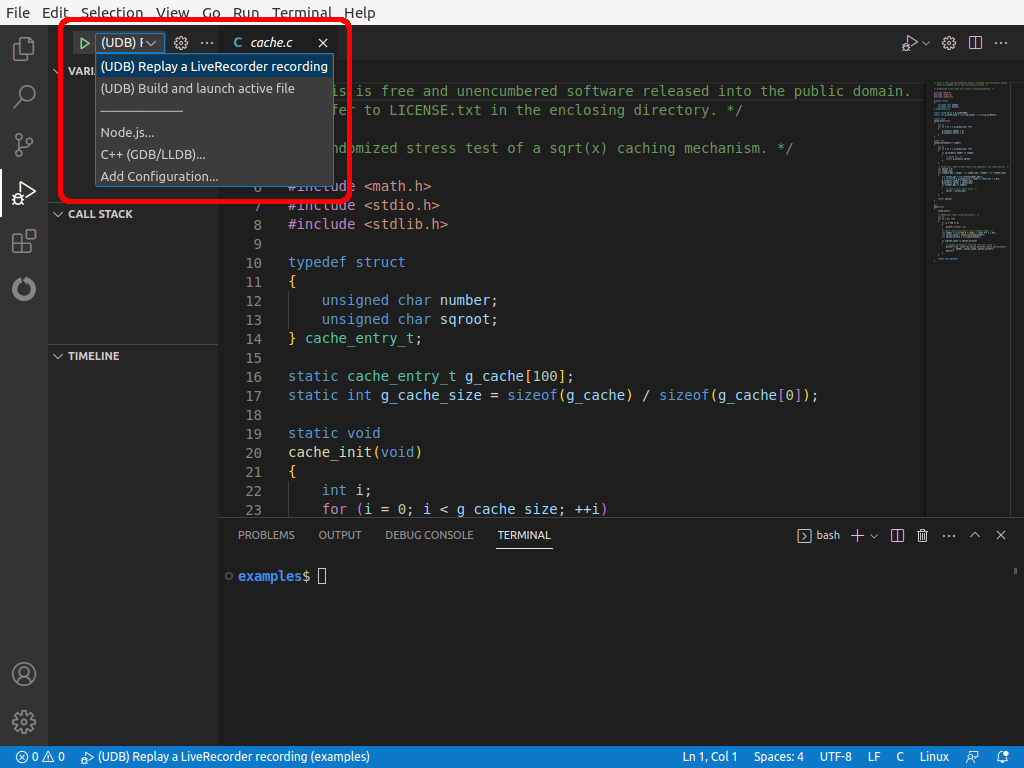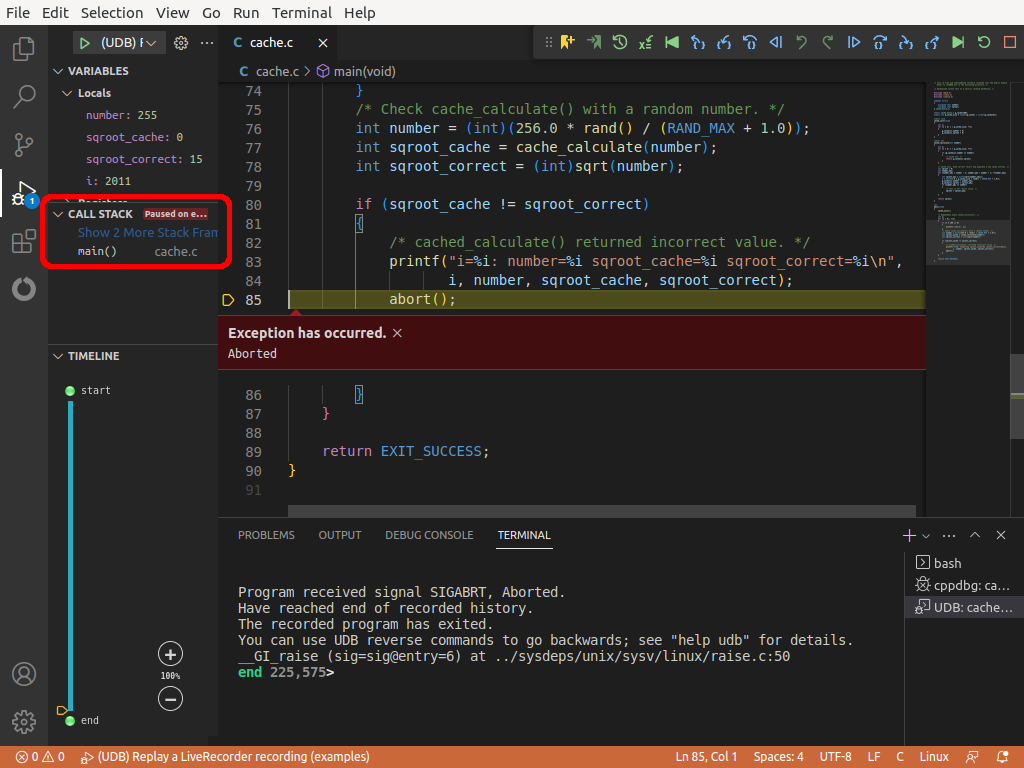Loading and saving recordings¶
UDB can load and save Undo recordings.
Loading recordings¶
Loading an Undo recording loads the execution history of the program loaded from the recording file, including any debug symbols, so that it is ready to be replayed. It also loads bookmarks created by the same user when previously replaying the recording.
Load a recording using the uload command in UDB, or by specifying the filename on the UDB command line.
Loading a recording from the command line¶
You can specify an Undo recording when starting UDB. When a recording is passed as a command-line argument to udb, it is automatically loaded. For example:
$ udb recording.undo
Reading symbols from /tmp/undodb.001/debuggee-1/symbol-files/lib/x86_64-linux-gnu/libm.so.6...
Reading symbols from /tmp/undodb.001/debuggee-1/symbol-files/lib/x86_64-linux-gnu/libc.so.6...
Reading symbols from /tmp/undodb.001/debuggee-1/symbol-files/lib64/ld-linux-x86-64.so.2...
0x00005555555550c0 in _start ()
start 1> continue
Continuing.
Program received signal SIGABRT, Aborted.
Have reached end of recorded history.
The recorded program has exited.
You can use UDB reverse commands to go backwards; see "help udb" for details.
__pthread_kill_implementation (no_tid=0, signo=6, threadid=<optimized out>)
at ./nptl/pthread_kill.c:44
44 return INTERNAL_SYSCALL_ERROR_P (ret) ? INTERNAL_SYSCALL_ERRNO (ret) : 0;
end 212,881> backtrace
#0 __pthread_kill_implementation (no_tid=0, signo=6, threadid=<optimized out>)
at ./nptl/pthread_kill.c:44
#1 __pthread_kill_internal (signo=6, threadid=<optimized out>) at ./nptl/pthread_kill.c:78
#2 __GI___pthread_kill (threadid=<optimized out>, signo=signo@entry=6) at ./nptl/pthread_kill.c:89
#3 0x00007ffff7d0427e in __GI_raise (sig=sig@entry=6) at ../sysdeps/posix/raise.c:26
#4 0x00007ffff7ce78ff in __GI_abort () at ./stdlib/abort.c:79
#5 0x00005555555553f4 in main () at cache.c:85
uload [-e|-goto-end|-local|-remote] filename¶
Load an Undo recording.
The filename argument names the recording file.
For example:
$ udb not running> uload recording.undo 0x00005555555550c0 in _start () The debugged program is at the beginning of recorded history. Start debugging from here or, to proceed towards the end, use: continue - to replay from the beginning ugo end - to jump straight to the end of history start 1 at-start> continue Continuing. Program received signal SIGABRT, Aborted. Have reached end of recorded history. The recorded program has exited. You can use UDB reverse commands to go backwards; see "help udb" for details. __pthread_kill_implementation (no_tid=0, signo=6, threadid=<optimized out>) at ./nptl/pthread_kill.c:44 44 return INTERNAL_SYSCALL_ERROR_P (ret) ? INTERNAL_SYSCALL_ERRNO (ret) : 0;If a replay service is configured,
uloadtries to load the recording on the local machine first, falling back to remote replay via the replay service if needed.
- -e, -goto-end¶
Jump to the end of execution history immediately after loading. This has the same effect as the ugo end command, but can be substantially faster.
$ udb not running> uload -e recording.undo 0x00005555555550c0 in _start () Performing "ugo end" to jump to the end of the recording. Press ^C to interrupt this and go back to the start.
- -local¶
Attempt to load the recording on the local machine only. If this option is specified, UDB does not use the replay service, even if it is configured.
- -remote¶
Attempt to load the recording using the replay service only.
info recording-version¶
The Undo version used to create the loaded Undo recording.
For example:
end 212,881> info recording-version 9.1.0
Going to the end of execution history after loading¶
By default, UDB starts replaying the recording from the beginning of execution history, but when investigating a crash it is often more convenient to start at the end.
Use the udb --load-goto-end command-line option to start
debugging the loaded recording from the end of execution history. This
is significantly faster than loading the recording and issuing the
ugo end command as separate steps. For example:
$ udb --load-goto-end recording.undo
Reading symbols from /tmp/undodb.002/debuggee-1/symbol-files/lib/x86_64-linux-gnu/libm.so.6...
0x00005555555550c0 in _start ()
Performing "ugo end" to jump to the end of the recording. Press ^C to
interrupt this and go back to the start.
end 212,881> backtrace
#0 __pthread_kill_implementation (no_tid=0, signo=6, threadid=<optimized out>)
at ./nptl/pthread_kill.c:44
#1 __pthread_kill_internal (signo=6, threadid=<optimized out>) at ./nptl/pthread_kill.c:78
#2 __GI___pthread_kill (threadid=<optimized out>, signo=signo@entry=6) at ./nptl/pthread_kill.c:89
#3 0x00007ffff7d0427e in __GI_raise (sig=sig@entry=6) at ../sysdeps/posix/raise.c:26
#4 0x00007ffff7ce78ff in __GI_abort () at ./stdlib/abort.c:79
#5 0x00005555555553f4 in main () at cache.c:85
This can be configured for all UDB sessions by setting
UNDO_load_goto_end to true in the environment.
Replaying on a different CPU¶
Replaying a recording that was created on a different CPU requires that the replay CPU supports all the instructions used by the program when it was recorded. Unless a replay service is configured, UDB refuses to load a recording if these requirements cannot be satisfied, although a warning may be shown instead when loading recordings made with older versions of the Undo Engine.
The info replayability command shows the CPU features required to replay the loaded recording.
info replayability¶
The CPU features required to replay the loaded Undo recording.
The features are reported in the same style as they appear in the flags fields of
/proc/cpuinfo. A feature is listed if the program executed an instruction requiring that feature when it was originally recorded. Any hardware which supports all of the listed features can be used to replay this recording.For example:
end 212,881> info replayability The CPU features required to replay the recording are: avx avx2 bmi1 lm sse sse2.
Backwards compatibility¶
UDB can load Undo recordings that were generated by older versions of the Undo Engine.
The current version of UDB can load recordings generated by any stable version of the Undo Engine from 6.5 onwards.
Support for old versions will be dropped when required in future releases, and this will be announced in the UDB changelog. Generally we aim to preserve support for recordings made by versions that are up to three years old, with older releases supported on a best-effort basis.
UDB cannot typically load recordings that were generated by newer versions of the Undo Engine.
Note
Loading recordings made by newer versions of the Undo Engine may succeed if our internal recording format was not updated in the newer version, but you should avoid relying on this behavior.
Attempting to load a recording made by a release that is too old or too new will cause an error message to be printed in your UDB session and the load will fail.
Saving recordings¶
usave [filename]¶
Save execution history as an Undo recording.
The optional filename argument names the recording file. If omitted, a suitable filename is automatically generated.
The recording can be loaded into UDB using the uload command.
Recording File Locking¶
Recordings are locked while they are being written in ordrevent other Undo processes from accessing them before they are mpleted.
Attempts to save a recording to a file path that is already being saved to will fail:
$ live-record -o recording.undo true
live-record: Maximum event log size is 1G.
live-record: Saving to recording.undo ...
live-record: Failed to save recording recording.undo: Recording is being written in another process..
live-record: Detaching...
Attempts to load a recording that is being saved to will also fail:
$ udb recording.undo
Failed to load Undo recording.
because: Recording is being written in another process.
Added in version 6.5.

